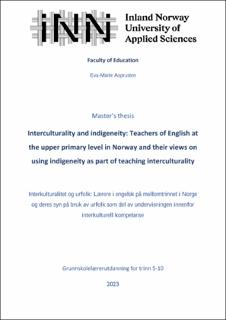| dc.contributor.advisor | | |
| dc.contributor.author | Asprusten, Eva-Marie | |
| dc.date.accessioned | 2023-07-18T16:10:20Z | |
| dc.date.available | 2023-07-18T16:10:20Z | |
| dc.date.issued | 2023 | |
| dc.identifier | no.inn:inspera:136493732:37299177 | |
| dc.identifier.uri | https://hdl.handle.net/11250/3079776 | |
| dc.description.abstract | Interkulturell kompetanse har vært en del av grunnskoleopplæringen i lengre tid. Men i læreplanen for Kunnskapsløftet (LK20) nevnes interkulturell kompetanse som begrep. Denne master oppgaven forsøker å forstå hva engelsk lærere på 5-7 trinn tenker om begrepets forhold til bruk av urfolksperpektivet til å fremme interkulturell kompetanse blant elevene.
Oppgaven viser min forståelse av hvordan de ulike lærerne definerer begrepet interkulturell kompetanse samt begreper i nær relasjon til den termen. I tillegg til det forsøker oppgaven å avdekke hvordan tekster om urfolk benyttes til å promotere interkulturell kompetanse. Samt dra inn perspektiver om hvordan man kan bruke urfolksperspektivet til å promotere god kunnskap knyttet til interkulturell kompetanse.
Resultatene antyder at lærerne i denne forskningen fokuserer på kunnskap om egen kultur samt kunnskap om urfolk i tillegg til å kunne relatere og sammenlikne det de lærer til seg selv og samfunnet slik det er i dag. Fokuset deres er likevel knyttet mot bruk av tekster skrevet av en tredjepart for å promotere slik kunnskap i mer eller mindre grad. Enten som innfallsvinkel eller hovedelement i deres undervisning. Fokuset fremover burde kanskje derfor å gi lærere informasjonen og kunnskapen nødvendig til at de implementerer autentiske kilder i undervisningen i mer eller mindre grad og at elevene får muligheten til å øve seg på å reflektere og tenke kritisk over det de lærer i relasjon mot urfolksperspektivet. | |
| dc.description.abstract | Intercultural competence has been a part of primary education for a longer period of time. However, the term is specifically mentioned in the core curriculum of 2020 named “Kunnskapsløftet 2020”. This thesis tries to understand what teachers of English at the upper primary level think of intercultural competence and its connection to the usage of texts about indigenous peoples to promote intercultural competence in the learners.
The thesis shows my interpretations of how the different teachers of this research defines the term intercultural competence and terms in relation to intercultural competence. It also attempts to show how texts about indigenous peoples are used to promote intercultural competence and to show perspectives about how one could use the indigenous perspectives to promote good intercultural knowledge.
The results imply that the teachers interviewed in this research prioritize the promotion of knowledge related to their own culture and that of the other. In addition, it is implied that the teachers want the learners to be able to compare and contrast the knowledge about the other to themselves and today’s society. However, the research shows that the focus of the teachers is still connected to the usage of texts about indigenous peoples to a greater or lesser extent, either as a starting point or as the main element of their teaching. One could therefore suggest that the focus going forward should be to give the teachers knowledge and tools that makes them able to implement authentic sources in their teaching, and that they encourage the learners to think critically about what they are learning in relation to indigenous peoples. | |
| dc.language | eng | |
| dc.publisher | Inland Norway University | |
| dc.title | Interculturality and indigeneity: Teachers of English at the upper primary level in Norway and their views on using indigeneity as part of teaching interculturality. | |
| dc.type | Master thesis | |
